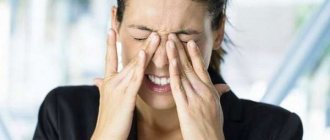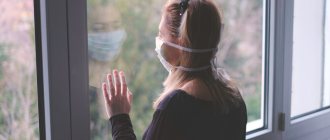Causes of the disease
Most often, hypnophobia occurs in childhood.
Children have a very mobile psyche, they are emotional and receptive to new sensations. Watching a scary movie, reading a horror book, or hearing a story can leave a deep imprint on a child's mind. He will be afraid to go to bed, expecting the realization of all the bad things he has learned. He is overcome by a series of nightmares, which only cements the horror in the subconscious. Usually, childhood fear tends to pass over the years, but you still need to keep it under control so that it does not develop into an adult phobia. With the advent of cinema, the theme of nightmares became very popular. In films, scary monsters come at night, maniacs appear who wait for the onset of darkness. All these episodes can affect impressionable people. After such shots, they are afraid to go to bed, peer into the darkness, and cannot leave their body without control. They are overcome by fear, the heart is seized with anxiety before going to bed, which gradually develops into a panic disorder.
- thoughts of helplessness during sleep;
- fear of dying at night.
- increased sweating;
- cardiopalmus;
- headache;
- insomnia;
- dry mouth;
All these symptoms complement each other, causing severe discomfort in a person. Many people try to relieve symptoms with medications. For example, they use sleeping pills or sedatives to get rid of anxiety and fall asleep. But this method only dulls the manifestation of the disease, blurring the whole picture. When making a diagnosis, this can greatly hinder the specialist, so you should not use medications without a diagnosis.
First of all, hypnophobia is dangerous because of its consequences. At night, the body recovers from everyday work and accumulates strength for new tasks. If sleep is interrupted, then its quantity and quality are reduced, which does not have the best effect on a person. Hypnophobes look tired and exhausted, and they are prone to aggression. But who could control himself and control his body when sleep lasts several hours with interruptions of anxious thoughts and fears?
This is why hypnophobia must be treated as quickly as possible. Emotional devastation and physical weakness can lead a person to more serious mental disorders - depression and neurosis. In addition, lack of sleep has a detrimental effect on physical health: vision can deteriorate, muscle weakness can cause cramps, and breathing difficulties can lead to panic attacks. Forced insomnia can provoke hallucinations.
Considering all the consequences, it’s scary to imagine what a hypnophobe experiences. Therefore, if you or your loved ones are gripped by this fear, try to contact a specialist as soon as possible.
Should you be afraid of bad dreams?
Should you be afraid of bad dreams? ⠀ A fact is the most stubborn thing in the world. And the statistics are such (the project has them) that most bad dreams and nightmares are not about the future at all. ⠀ Every time there is a joint sleep affirmation for healing or such as now “Strength and Light” - it is for energy recharging in a dream. I know in advance that there will be some participants who may have not entirely pleasant dreams on the first night. ⠀ And that's normal. Let me explain the nature of such “phenomena.” The principle is the same as in any project program scheme. How can you (figuratively) fill your vessel with clean water if it is full of dirty water?
For example, if you are currently overwhelmed with worry, stress, worried about something, you have a constant feeling of fear... Then most likely subconsciously you will first want to get rid of the negative. And in a dream based on affirmation, you will first see everything that oppresses you in a symbolic form. And that's okay. That's actually good. When you experience your fear or anxiety in the plot of a dream according to the most unpleasant scenario for the development of events, you thereby cleanse your psyche of this negativity and fear. ⠀ And in the next nights you will “fill” the free space with clean energy.
Unpleasant dreams are better understood.
Unpleasant dreams very clearly show the essence of the problem, and sometimes they immediately show what needs to be gotten rid of. I looked at your comments under the post af . And I’ll tell you by category of dreams what they can mean. ⠀ Dreams about past relationships. Often indicate an energy leak. It's possible that your memories still upset you. As an option, the door to the past needs to be closed more tightly (the project has a webinar “Stopping the outflow of energy to your ex” ) ⠀ Some inconsistency with the situation or actions: being late, the feeling that you won’t have time or won’t be able to do something. Dreams are synchronized with how you feel in life. Worry that you are not coping with the situation. And this also takes a lot of your energy.
Help in dream interpretation
Dream book of dreams come true
Affirmations for dream practice in the book
BOOK “PREPIC DREAMS AND CONSCIOUS DREAMS”
In this case, you need to analyze your actions in reality. These are dreams with non-rigid symbols. Once you plan your actions and calm down in life, everything around you will change. This state of affairs depends only on you. The project loves the practice of “returning to sleep” - see the link in the story - this is an accelerated option for influencing physical reality.
Seeing yourself ugly or old or poorly dressed in a dream. This is how “fatigue” from life or circumstances is visible. Same. These are not hard symbols. And the best way out is to change some habits. Choose the simplest ones. They will be the most effective. If you don’t come up with it yourself, I’ll tell you in one of the following posts. ⠀ And let's return to our practice. Affirmation #poweroflighttamagikum - active for 3 days. Its action continues for the same amount of time. It is better to track the symbols of your dreams and write them down. They are like navigators - they tell you what type of energy suits you best at a given period.
I conduct all my broadcasts on my account instagram.com/sonnik_magickum ... almost every day.
ONLINE WISH FULFILLMENT PROGRAM
MAGIKUM BLOGS - ONLINE INTERPRETATION OF DREAMS
PAID INTERPRETATION OF DREAMS
DREAM BOOK OF DREAMS COME TRUE
AFFIRMATIONS FOR PROPHETIC DREAMS
PERSONAL DREAM AFFIRMATION (order)
LUNAR CALENDAR OF DREAMS
PROJECT BOOKS
*
*
Desires REVIEWS AND REGISTRATION HERE
Author: Victoria Sokolova
All comments and discussion on the Magikum Blogs.
Interpretation of dreams live - Magikum video.
Tags: magicum blogs, if you had a bad dream, getting rid of stress in a dream, how to make it so that you have a nightmare, magicum affirmations, magicum calendar of affirmations, Should you be afraid of bad dreams, had a nightmare, had a bad dream, had a horror dream, dreams had a nightmare, dream book magicum, what to do if you had a nightmare, what to do if you had a bad dream
Diagnosis of a phobia
The main method of diagnosis is a personal conversation with restoration of the full picture of the disease. It is necessary to tell a psychiatrist or psychotherapist how you feel before going to bed, describe your physical well-being and emotions. If the fear is caused by nightmares, it can be very difficult to reconstruct its root cause. Therefore, the doctor will look for any traumatic moments that are, in one way or another, related to sleep.
Many experts believe that yoga and meditation are good additions to therapy. A person learns to control his body and relax. Accompanied by aromatherapy and pleasant music, this method has a strong relaxing effect. Any hobby can be the key to getting rid of fear. Thoughts are busy with some interesting thing, attention is concentrated on a new object, there is less and less room for worry and anxiety. Long walks and physical exercise in the fresh air have a good effect on both physical health and emotional background, which has a beneficial effect on a hypnophobe.
And, of course, as with any mental disorder, personal attitude plays a huge role in getting rid of a phobia. You need to look to the future with optimism, believe in your own strengths and capabilities, then any fear will remain in the past.
vseostresse.ru
Main causes of chronic sleep deprivation
If all of the above symptoms apply to you, then you need to take proper measures to eliminate this problem. The problem of insomnia itself can develop for numerous reasons. The epicenter of the development of insomnia can be a number of mental and a number of somatic diseases, namely:
- prolonged depression;
- diseases of the nervous system;
- asthma;
- overwork;
- stress;
- heart failure;
- alcohol and drug abuse;
- kidney diseases;
- arthritis;
- encephalitis.
Insomnia can also be a consequence of an unhealthy lifestyle or bad habits. For example, this applies to caffeine lovers or those people who experience stress on a daily basis.
Still, there is great news - most often, sleep disorders can be cured! This can be done without taking medications.
The psychology of insomnia is a search for answers to important questions: the causes of sleep disturbances, ways to overcome them. A person who has experienced periods of insomnia is familiar with the feeling of the inability to switch off, to forget, the cycle of thoughts, experiences, and events of the day. Often the reasons for this phenomenon are at the psychological level.
The human body is structured cyclically - there is a time of activity and relaxation, a transition to a state of “relaxation” - sleep. In fact, the body continues to work, but the pulse slows down somewhat, the temperature drops, attention is concentrated on internal processes, and the outside world does not have much influence during sleep.
Sleep is necessary for the body to restore lost physical strength and find peace. Long-term insomnia is exhausting and leads to exhaustion, impairs perception, concentration, and stability of the body. Ways must be found to reduce the impact of this phenomenon on life. In rare cases, there are people who are able to live with minimal periods of sleep or no sleep at all.
Let's take a closer look at the psychology of insomnia, known sources, and the root causes of sleep disturbances of a psychological and physical nature.
Sleep usually takes up 1/3 - ¼ of a person’s life. During sleep, very important processes occur in tuning the body for optimal functioning in the waking state. Usually, when clients turn to a psychologist with complaints of insomnia or poor sleep, this “trace” comes from the psychological problems that a person faces while awake, as well as from diseases that worsen at night. Therefore, the problem of insomnia must be solved from two sides: both medical and psychological.
Causes of insomnia
There are a lot of factors that cause sleep disturbance, and sometimes they act in combination. Among the most common reasons are the following: staying in a stuffy and dusty room; the presence of infectious diseases and muscle stiffness caused by sedentary work;
asthma, apnea (night snoring) and other diseases; an overabundance of information received during the day that the brain was unable to analyze in a timely manner; stress and emotional overload, psychological fears; use of certain medications. Age, gender, outlook on life and even level of education also influence.
Insomnia in women and men
Doctors mainly associate female insomnia with hormonal changes: menstrual periods, pregnancy, menopause. These days, physical and emotional fatigue increases. However, in general, according to research, in 30% of women, strong personal experiences and concerns about children cause not just one-time sleep disturbances, but chronic insomnia.
Men are more physically stable in terms of hormonal changes, but they have problems with sleep no less often than women. As a rule, the cause is external factors (alcohol, coffee, use of sports nutrition, medications), problems at work, low earnings and quarrels with loved ones.
It has long been known that optimists sleep much better than pessimists. They know that a new day will come and problems will be resolved. People with a pessimistic outlook on life suffer from insomnia much more often. A person who believes that there are enemies all around is always in an excited state, which will be the source of insomnia.
Increased anxiety often manifests itself in difficulty falling asleep. If a person suddenly wakes up in the middle of the night, the reason may be hidden depression or existential fears. Let's talk in more detail about the main psychological causes of insomnia.
Fear of life, of death, of change, of the new. A person suffering from fear experiences many situations in his mind. And at night there is plenty of time for this “pleasure”. If insomnia has been around for a long time, an obsessive fear of “not falling asleep” may arise.
Someone is afraid of having a nightmare or dying in their sleep. A person cannot get this terrifying idea out of his head that prevents him from falling asleep. And, while still awake, it unconsciously delays the time of going to bed, which causes a psycho-physiological imbalance.
Thoughts about an important unresolved problem, about the health of loved ones, about feelings of guilt, etc. can have the same power. If thoughts begin to take over physiology and become the cause of insomnia, you need to seek help from a specialist.
The second cause of mental stress that causes insomnia is a lack of pleasure.
If basic desires - sex, relaxation, pleasant communication, doing favorite things and other pleasures - are not satisfied at all, a person may feel irritated and anxious. This is usually characteristic of people who live under the motto “should” and “must”. It seems to them that the most important thing is business, and “an hour for fun” is wasted time. As a result, tension accumulates in the body, which interferes with sleep.
Often, when going to bed, a person begins to conduct an internal dialogue with someone who offended him, with whom he competes, or think about those he envies or worries about. At this moment, both his mind and body are restless. Strong emotions accumulate, endless pictures are drawn in the head. No time for sleep.
This condition occurs as a result of prolonged receipt of information in the form of words and visual images. And if you subject yourself to similar tests every day, it will interfere with falling asleep quickly and good sleep.
Negative thinking and constant return to situations from the past
A person becomes very immersed in thoughts and fantasies, and the body begins to work as if the imaginary is happening now. Involuntary muscle tension appears (and a person cannot fall asleep until all the muscles of his face and body relax), the brain is actively working. You can’t even dream about normal sleep.
General overload of stressful situations
Sometimes a person begins to find himself in so many situations that he does not have time to digest it in time. The process will take place in the evening in bed, quite slowly and painfully.
Diffidence
A person is at a loss and does not understand how to act - he does not trust himself and others. Torment in decisions and actions does not leave him day or night.
Remember that wakefulness and sleep are two main states in the life of every person. Treat them with respect. Follow the ritual of transition from one state to another. For example, 30–45 minutes before bedtime, stop watching stimulating TV programs, sorting out relationships, and computer games.
Switch your thoughts to the positive: think about what good you had today, for which you are grateful for this day. You can listen to music for relaxation, turn off bright lights. Before going to bed, try to do all your movements slowly, slowly, smoothly.
In bed, before you fall asleep, lie on your back. Stretch your arms and legs freely. In your mind's eye, look around your body and look for tense muscles. Once you find them, mentally begin to observe them until they relax. Often, after muscle relaxation, drowsiness appears. Wish yourself good night and fall asleep in a deep and sound sleep.
Sources used: www.b17.ru
Fear of sleeping alone is a phobia
July 25, 2020, 5:20 pm
Good day everyone. My name is Alina, I’m already 22 years old, and as for such fear, I’m already old enough to be so afraid of the dark, namely, to stay at home alone in this very darkness. it all started 6 years ago. I stayed at home with my stepfather (I didn’t see him as a defender, since he beat me, thank God he and my mother didn’t live together for a long time) and then at 3 o’clock in the morning. I remember well. it was 3.05. it’s hard to write. I hear a noise (something fell in the kitchen), I react very quickly to noise, and my stepfather was fast asleep in the next room. I turned on the light and went to the kitchen, but something inside didn’t let me in, I didn’t open the door there, she returned to her stepfather and in a trembling voice said that there was noise there, we went there, we went in, and there was a window that was open, the tulle and curtains were moved to one side. Sorry for my Russian, my native Ukrainian. He went out into the street with a lantern, but there was no one there. Since then, I often wake up at night and I’m scared to look at the clock; I sleep when I’m alone, with the clock on. light, but when I turn it off, it starts to become a little clearer. I’m very afraid. Help
July 25, 2020, 5:43 pm
I’m 25. Nothing bad has ever happened to me in my life, but after I turned 20 or a little later, I’m afraid to spend the night alone. Before this age, I often spent entire weekends alone, I had never encountered anything like this. Now, when it’s getting dark and there’s no one in the house, I turn on the TV in the next room, music, and don’t let the cat out of the room, just so as not to feel alone in a dark apartment. When I need to go to bed, the worst thing is, I turn off the light, jump into bed on the run and cover my head. God forbid I want to drink or go to the toilet at night - I won’t even be able to get up - it can take me 30 minutes to decide. This is how I live. What is there to do?? Since there are no prerequisites for such fear, I don’t think that a psychologist or anyone else can help me. In general, after I turned 20, I began to be afraid of anything; before that I was a daredevil.
July 25, 2020, 5:49 pm
I'm 34 and this also started recently. I imagine that they will climb in and kill me. but I guess where the legs grow from. Throughout my childhood, my drunken father would come at two in the morning and I was afraid that there would be another scandal, he would go wild and kill us.
I’m also afraid if I sleep alone at home with only the lights on and the TV on))) I’m not ashamed. I just accepted the fact that I am very impressionable. Author, if you believe in God, place the icon near the bed, cross the bed and the room before going to bed, and sprinkle it with holy water.
Pfft, I’m 31 and I’m so fucking afraid of being alone, I went alone to the dacha to spend the night, it didn’t help, the fear only intensified.
July 25, 2020, 5:51 pm
sounds like anxiety neurosis author. I advise you to contact a psychotherapist to solve this problem. For reference, neuroses take years to mature, and the incident you described could have become a catalyst for the development of a phobia. But most likely this is not the reason. Contact a psychotherapist, analyze and solve all your phobias and fears, obvious and hidden.
July 25, 2020, 6:02 pm
on the first floor, install bars. You can have a cat or a dog, they will hear first. There are more pots on the windowsill, and basins under them. Sleep with the stun gun on.
July 25, 2020, 6:07 pm
on the first floor, install bars. You can have a cat or a dog, they will hear first. There are more pots on the windowsill, and basins under them. Sleep with the stun gun on.
That time there was a dog, but she didn’t react, at night she doesn’t even react to my friends, at whom she barks during the day. And the cat slept with me then like dead. I need to save light)) and get rid of fears.
m.woman.ru
I'm afraid to sleep at night - Online psychologist
Lily Author of the post
I can’t sleep at night. As soon as I turn everything off, I lie down, 5 minutes pass and wild fear begins to grow, after another 5 minutes I can’t stand it, I turn on the light and the computer. One time even this didn’t help, I turned on the lights in the whole apartment, the TV, sat and sweated with fear, the fear was so strong that I wanted to run out into the street at half past four in the morning and return only at dawn! I fell asleep only when it was already dawn.
I'm so upset that I want to cry! I feel powerless over this. I am 21 years old! Soon I’ll have to live alone in an apartment, and I can’t imagine how I’ll sleep there! I have to get up early in the morning, it’s already 5 am, but I can’t turn off the light and laptop. The first attempt was at 3.15, at 3.30, everything was turned back on. Just for no reason, it’s wildly scary to do anything! I tried to pray at night - it didn’t last long... about 20 minutes in the dark.
While I was taking sedatives it helped, I stopped drinking and I became sick again. I can't sit on them all the time. It is true that there are quiet nights, even without sedatives, but rarely, mostly when I am very tired. It’s also scary with light... I’m in despair... I really want to learn how to sleep at night. please, help!
feedest.ru
Autophobia (fear of loneliness) - symptoms, treatment, advice
Autophobia is a fairly common mental disorder. It is based on a person's fear of being alone. Also, the fear of loneliness may be called monophobia or isolophobia. Timely identification of a problem can save a person’s life, because in addition to constant anxiety, there is a danger of committing suicide . the largest number of suicides are recorded annually .
Causes
The causes of such a disorder can be obvious factors, as well as sometimes the most unexpected events in life. The disease can develop in early childhood. Many adults tell kids: “Calm down, otherwise I’ll leave you here and go away.” It seems like a harmless phrase that can stop a child’s hysteria. But it is precisely this that can become the first building block in the formation of that very fear of abandonment. At an older age, the impetus for the development of a phobia can be a breakup of a relationship or the death of loved ones.
It is very difficult to clearly determine why a person began to fear loneliness. But we can still identify the most common reasons:
Afraid to sleep at night: fear of the dark and night
If an adult is afraid to sleep in the dark and leaves the night light on, is this abnormal? I always do this when my husband is not at home, and I recently read that this is a deviation and harmful to sleep in the light. Is it so? What should I do, because I’m afraid to sleep alone without light (if I have a husband, then no problem, but he’s often on business trips).
Being afraid to sleep in the dark at night is common not only to some children, but also to adults. The reason for this is most often the fear of children. For example, through scary tales about Baba Yaga, stories about a black hand under the bed, especially stories about someone being eaten by someone, etc. Normally, this fear should go away as you grow older and turn into its opposite - compassion. If the baby develops correctly, then the fear of sleeping in the dark disappears, and he begins to sleep in the dark without problems.
An adult is afraid to sleep on his own - what to do?
But this does not always happen, and then an adult is afraid to sleep alone, just like a child. The situation is aggravated by the fact that the modern film industry produces a large number of horror films, maintaining a state of fear. This kind of cinema is captivating and interesting to consume. But in the end, we don’t notice how the problem is growing - fears in real life. This is a premonition of something terrible, and constant anxiety, and the fear of sleeping in the dark, etc.
For proper rest, a person should sleep in a dark room; this is the optimal environment for sleep. If you are afraid to sleep at night without light, this is not the norm.
Just yesterday, such people were doomed to live their whole lives in fear, afraid to sleep alone in a room, suffering from panic attacks and flinching at every rustle. Today everything has changed. Any adult can follow the path that he had to take in childhood: push the state of fear into love. What does this mean and how to do it, read more in this article.
www.neobhodimo.com
Symptoms and manifestations of fear of loneliness
The course of such a disorder can be so invisible that it is sometimes simply impossible to identify it. This behavior is typical for people who lack self-confidence, residents of modern cities, as well as teenagers.
Treatment of autophobia
Of course, the fear of loneliness can be overcome. And this needs to be done as soon as possible. As soon as a disorder has been identified, you need to seek help. It is very difficult to get rid of phobias, especially of this kind, on your own. The best medicine in this case is the support of loved ones. Tips on how to get rid of autophobia:
- At the first manifestations of a phobia, a person needs to realize that it is not always possible to constantly communicate with people. Loneliness is normal.
- In order not to feel the full burden of this phenomenon, you just need to find something to do - a job, a hobby, or do household chores.
- A visit to a psychologist will help cope with anxiety and prevent it from developing into a more complex disease.
- You need to find some time for yourself in your life to break out of your daily routine. You can spend it in different ways: go to a store or cafe, meet friends, visit your family. In addition, this will additionally distract a person from gloomy thoughts about loneliness.
Psychotherapeutic approaches are based on searching for possible irritants - the causes of fear. Group classes are considered the most effective for autophobes. An awareness is developed that the patient is an independent person.
At the late stage of identifying and treating the disorder, a medication approach is used. The patient is prescribed antidepressants, sedatives and stimulants.
If you start treatment on time, autophobia will soon be left with only memories. This will not only preserve nerve cells and establish healthy relationships, but also eliminate the danger looming over a person’s life.
- social phobia - fear of society, pathological anxiety in front of various social situations;
- perform professional activities - ergophobia;
- blushing in public is erythrophobia.
- Dentophobia - fear of the dentist;
- autophobia - fear of loneliness;
- gerontophobia - fear/dislike of older people;
- mysophobia - fear of pollution;
- erythrophobia - fear of blushing.
Teenage suicide: how to protect your child from suicide
The problem of teenage suicide is one of the burning issues of our time. Causes, symptoms and methods of preventing child suicide.
Claustrophobia: overcoming the fear of closed spaces
Fear infects just like a runny nose, and every time it turns the singular into a plural (Goethe) Some of the most common types of phobias in modern times are fears of space, manifested in various forms. Among these types of pathological disorders, the most famous is the fear of closed spaces - claustrophobia. Distribution among the population This is a fairly common disease among miners who have personally experienced “imprisonment” […].
Bathophobia - fear of depth
Bathophobia is a phobic disorder associated with the fear of depth. The occurrence of this disorder may be associated with accidents on the water, as a result of which a person experienced emotional and psychological shock due to which he developed an unconscious fear of depth. Other causes of this disorder, when a person has not had negative experiences associated with depth in the past, may be subconscious anxiety: […].
fobiya.info
How to get rid of insomnia without drugs using folk remedies
Beverages
Milk drink with garlic
♦ To prepare this drink, you need to boil a glass of milk and chop about 20 grams of garlic. Add garlic to hot milk. Drink the prepared drink warm before bed.
Milk with honey and dill
♦ Combine one teaspoon of dill juice with one teaspoon of natural honey and dissolve the resulting pulp in one glass of warm milk. Take one teaspoon warm after meals. Store the drink in the refrigerator for no more than a day. This remedy is great for helping with restless sleep.
Dill tincture
♦ Grind one tablespoon of dill, combine with boiling water (one and a half cups). Let the drink brew. Take the tincture throughout the day, dividing it into several doses.
Cucumber pickle with honey
♦ To prepare the drink, you need to mix one glass of cucumber pickle with one tablespoon of natural honey. Divide the daily dose into several parts and take after meals.
Honey water
♦ Dissolve a tablespoon of natural honey in one glass of warm water. Drink honey water half an hour before bed. A drink made from milk and honey, prepared in the same way, has even greater benefits for insomnia.
Cinnamon milk
♦ Combine a glass of warm milk with one teaspoon of cinnamon. You should drink the prepared drink warm about an hour before bedtime.
pumpkin drink
♦ Combine a glass of natural pumpkin juice with one teaspoon of honey. This drink will not only cope with insomnia, but will also help get rid of swelling.
Chia seeds - beneficial properties of Spanish sage
Baths
If you have insomnia, do not forget about relaxing baths with beneficial herbs - chamomile, calendula, mint, string, motherwort. You should take such baths several times a week, for an average of 10–15 minutes. The water should be warm and pleasant to the body. Under no circumstances should you take a hot bath. A bath with honey, pine extract and essential oils (ylang-ylang, juniper) will have the same benefits for insomnia.
Folk recipes
♦ Mix a glass of lemon juice with two tablespoons of buckwheat honey. Mix the ingredients thoroughly until smooth. Add a little crushed walnut to the mixture. Take one tablespoon daily before bed.
♦ Soften the pulp of rye bread with a few spoons of sour milk. Add fresh cucumber pulp to the mixture. Mix the ingredients thoroughly. Apply this remedy to your forehead before going to bed.
♦ Mix a few drops (4 – 5) of lavender oil with one teaspoon of granulated sugar. Take the resulting product in small sips before bed. You can also lubricate whiskey with lavender oil.
Fear of sleep: how to cope with the disease and achieve healthy sleep?
Nowadays there are a huge number of phobias. Among them there are those that a person may not even remember without encountering the object of his fears. There are fears that make many people smile. But there are also those that place a huge burden on a person’s consciousness. They interfere with normal functioning and leading a full life. The fear of sleep can be attributed to this group. What is this phobia and how to cope with it?
Hypnophobia is an uncontrollable fear of sleep. It goes back to ancient times. People were afraid of darkness, because it was at night that the tribes attacked each other, supplies were depleted, and livestock was lost. All this was a direct threat to human existence. But in our time, the fear of falling asleep is not a defensive reaction, but a huge problem. Hypnophobes feel the negative effects of fear not only at night. It is not possible to get enough sleep; sleep duration is often reduced, which directly affects the quality of everyday life. Many people feel tired and weak during the day, their professional skills decline, and it becomes difficult to contact people around them. A person who is overcome by the fear of sleep can bring himself to extreme exhaustion mentally and physically, just to collapse and fall asleep instantly. Due to lack of sleep, metabolism is disrupted, problems with the heart muscle arise, and blood vessels become weak. Extreme discomfort is the main reason that motivates people to undergo treatment for hypnophobia.
The impetus can be communication with a person who suffers from hypnophobia. Trauma during sleep or an accident (for example, a person fell asleep with a cigarette, a house was robbed at night, breathing stopped while sleeping) can trigger a phobia, and in this case it is associated with the fear of dying in a dream.
Hypnophobia has not only psychological, but also physical symptoms. The first include:
Physical symptoms include:
I'm afraid to sleep alone - advice from psychologists
Hello Palina.
Regarding fear... There are different fears. There are fears that protect us from danger. These are justified fears, they are aimed at self-preservation; it is completely natural for every person to experience such fears.
But what is happening to you is something else, these are unreasonable fears, you are afraid of what is not, of what does not exist, you are afraid of your fantasies. And you are absolutely right, many people experience the same thing.
Usually all fears such as yours are just a distant echo of the main fear - the fear of death. Life is surrounded by death. You can often see how people die, see how something that was alive just a second ago dies. Every death reminds you of your own death. It is impossible to get rid of thoughts about your own death; she constantly reminds herself.
First of all, you need to understand that you can get rid of fear only by getting rid of the fear of death. Or rather, from a feeling of guilt that burdens death with fears. We don't really know what death is. We are simply afraid of being punished, through death, for the actions that we have committed, for the sinfulness that we carry within ourselves.
Contact a psychologist and try to figure out what you are really afraid of. All fears disappear when we stop running away from them, turn to face them and begin to get to know them.
I can offer you my help as a specialist. In my practice, I use Skype consultations.
Good luck with your own self-exploration.
Best regards, Oksana M.
Good answer5 Bad answer1
www.all-psy.com
What is the danger of a phobia?
It is very difficult to get rid of hypnophobia on your own. After all, this fear is usually accompanied by various anxiety disorders, aggravated by physical symptoms. To get rid of a phobia once and for all, you need to consult a specialist in psychiatry. The main method of treatment is psychotherapy. During the sessions, the specialist will relieve anxiety and restlessness associated with thoughts about sleep. It will show that many fears and worries are not at all justified. During therapy, misconceptions about the consequences of sleep will be corrected. In some particularly advanced cases, the doctor may prescribe drug treatment.
It is necessary to create a friendly environment at home - none of the loved ones should make fun of the patient’s fears or play on his nerves. You need to show your support and understanding, because the fight against phobias requires enormous courage and strength.
For some people, fear of sleep is complicated by the fear of being alone at night. In this case, it is recommended to get a pet that will be nearby, giving its owner a feeling of security and need.












